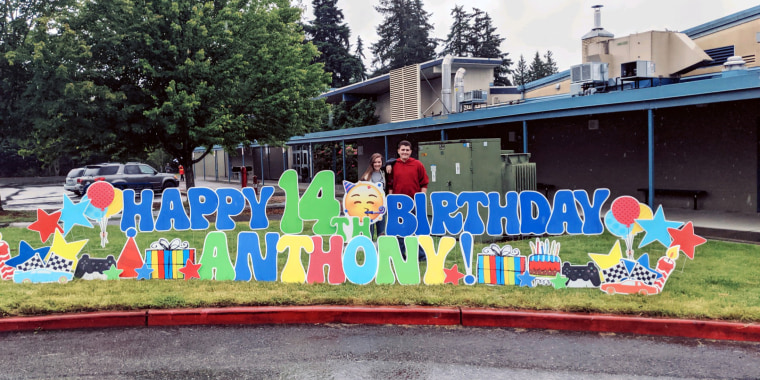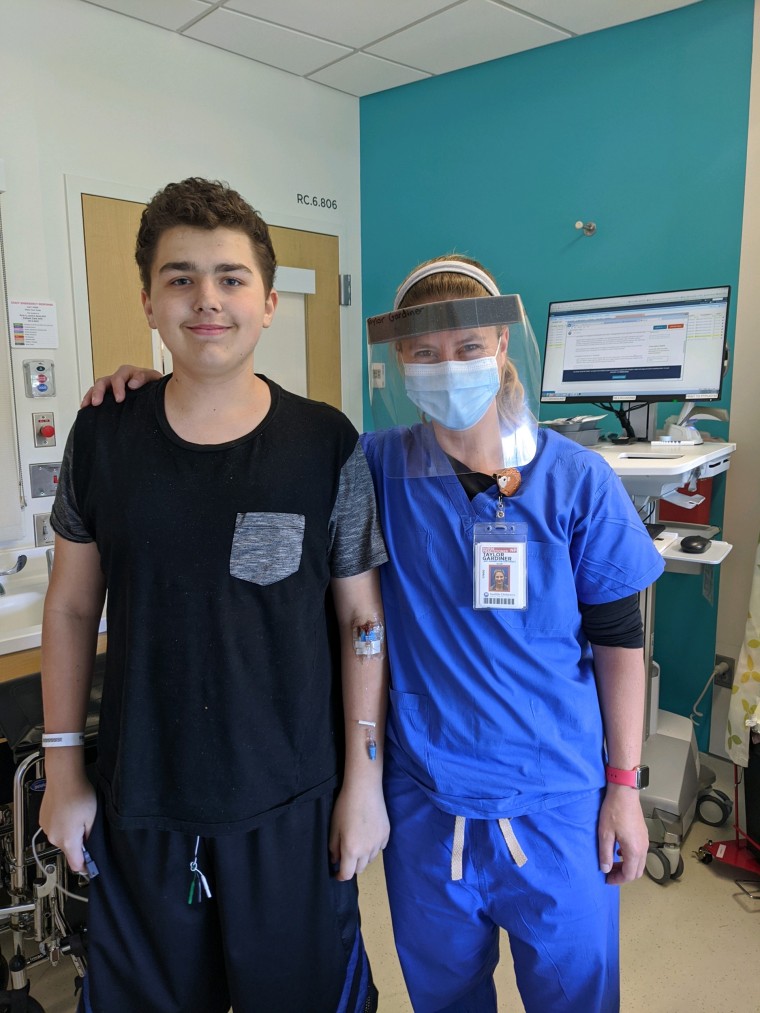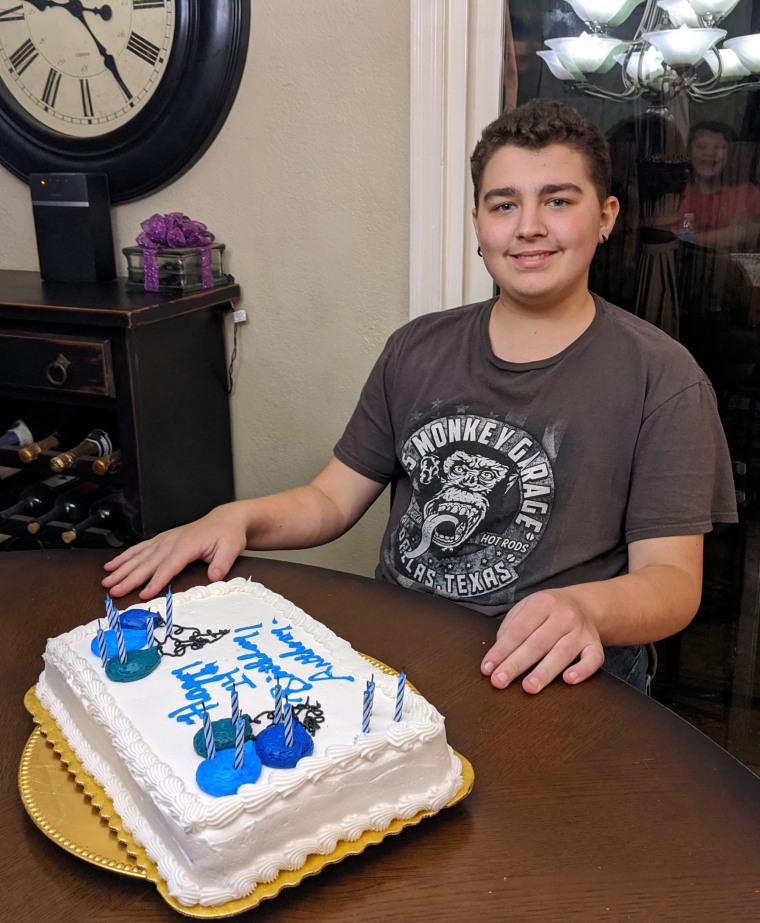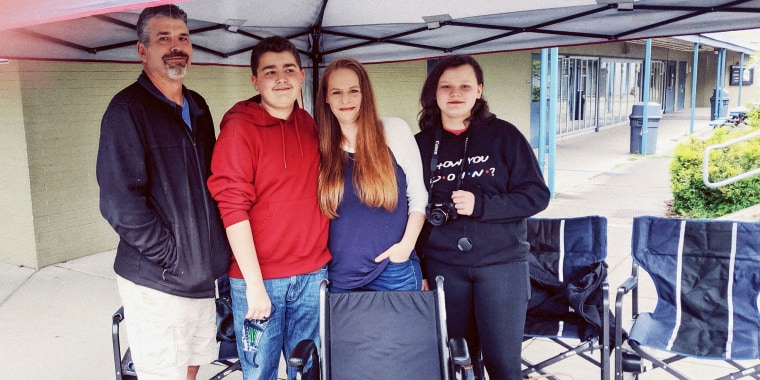When Anthony Lawson turned 14 years old on May 30, his entire community in Bothell, Washington, celebrated with a motorcade of vintage cars and a giant, custom-made happy birthday sign.
Just days before, Anthony had been discharged from Seattle Children's Hospital, where he stayed for two and a half weeks while doctors struggled to treat his organ failure, sepsis, cardiac arrest, toxic shock syndrome and hallucinations.
After Anthony's confounding conditions persisted for several days, his medical team realized he may have developed MIS-C, aka multisystem inflammatory syndrome in children, the mystery illness that's struck hundreds of kids in the U.S. since the coronavirus pandemic began. Most kids with documented MIS-C had previously been infected with COVID-19, and researchers believe them to be linked. Anthony tested positive for coronavirus antibodies.

In mid-May, the Centers for Disease Control and Prevention issued a warning about MIS-C, which can cause persistent fever, rash, abdominal pain, vomiting, diarrhea and red or irritated eyes. It can also lead to organ failure, and several children have died from it. In mid-July, the American Academy of Pediatrics released interim guidance for treating the condition, which is very rare.
The discovery of MIS-C has led to even more unanswered questions about the coronavirus and kids. Children infected with COVID-19 seem to be largely spared from severe illness, but it's unclear why. Public health experts also don't know how often kids spread the virus versus adults; recent research suggests people 10 and older are more frequent transmitters, but again, the reason isn't clear.
Anthony, who got sick in late April, was among the first 80 or so children with MIS-C, according to his mom, Theresa Lawson. She previously told TODAY that his symptoms, a headache and itchy eyes, were initially mild, but within a couple of days, he began vomiting regularly.
During a visit to urgent care and in follow-up calls, the Lawsons were told to let their son rest and take Benadryl. But when he developed a rash and fever that night, his father took him to a local hospital, where he learned his son was in cardiac and kidney failure. Anthony was rushed in an ambulance to the intensive care unit at Seattle Children's.

Speaking with TODAY again about a month after Anthony was discharged, Lawson said her family is still coping with the effects of MIS-C and her son is "never not in pain."
When Anthony first got home, he was taking 16 pills a day for his heart, kidneys, liver, joints, muscles and more. He will have to take several of these medications at least for the next year and maybe the rest of his life, Lawson said. In those initial weeks, Anthony, a basketball player and power lifter, also relied heavily on his wheelchair because he'd get dizzy and easily exhausted.
"Every organ in his body went through damage," Lawson explained. Doctors are still assessing the extent of it and possible long-term effects.
Now, Anthony's in physical therapy and can do light cardio, but he still returns to the hospital for several appointments with specialists each week, the only times he leaves the house. This frequency of visits will also continue for another year.
"Every time you make that drive, you get that pit in your stomach," Lawson added.
While Anthony's doctors' main concern currently is the state of his heart, a neurologist recently joined his health care team to assess MIS-C's effects on his brain. Family friends started a GoFundMe to help with the mounting medical bills.

As much as Anthony wants to return to life as a regular, soon-to-be high-schooler, he still has "bad days," Lawson explained. "He’s in bed. He’s hurting. He has terrible headaches from the medications. They’re really tough days." To make matters more challenging, they can't trace what causes them.
During tough nights, Lawson will check on her son every 15 to 20 minutes.
"There’s hardly a moment in the day when I don’t think about (what happened to Anthony), but the nights are tough when the kids are in bed, and these thoughts wash over you," she said. "It’s surreal ... It doesn’t feel like it’s really your life and really your kid."
Lawson has vivid memories from those dark weeks in the hospital — and so does Anthony. He actually remembers much more than his doctors had hoped.
"He went through hell. He said there were moments that he wanted to quit," she recalled. "As his mind has time to quiet, these things come back to him ... I think he’s fearful he'll go back to the hospital."
This thought, that the MIS-C could return with the same force, also weighs heavily on his mom.
"I pray to God that that this is a one-off thing, not just for us but for all these kids," Lawson said. "The hardest part is I’m never going to get any answers ... We can't say say, 'We're safe now,' or, 'We're less exposed.'"
Lawson desperately wants to imagine a future where Anthony's fully recovered, but at the same time, she's "hesitant to look too far down the line," she explained. "I'd pay any amount of money if somebody could tell me in that one year, everything will go back to normal."
For now, the Lawsons are appreciating their family time. "We don’t even take seconds for granted anymore," Lawson said.
More than once, Anthony's black humor about what he went through has sent his parents and younger sister into fits of laughing.
"To hear the laughter again in the house..." Lawson trailed off. "It was so hard to come home when he wasn’t here because he’s got so much life in him. It felt wrong."
A solid chunk of Lawson's time also goes to answering emails of scared parents seeking advice. She's incredibly grateful for all the support her family's received so she wants to "pay it forward."
"Otherwise, it was a terribly horrible experience that had no purpose," she said. "You shove down your emotional baggage and think, 'I can help someone today.'"

